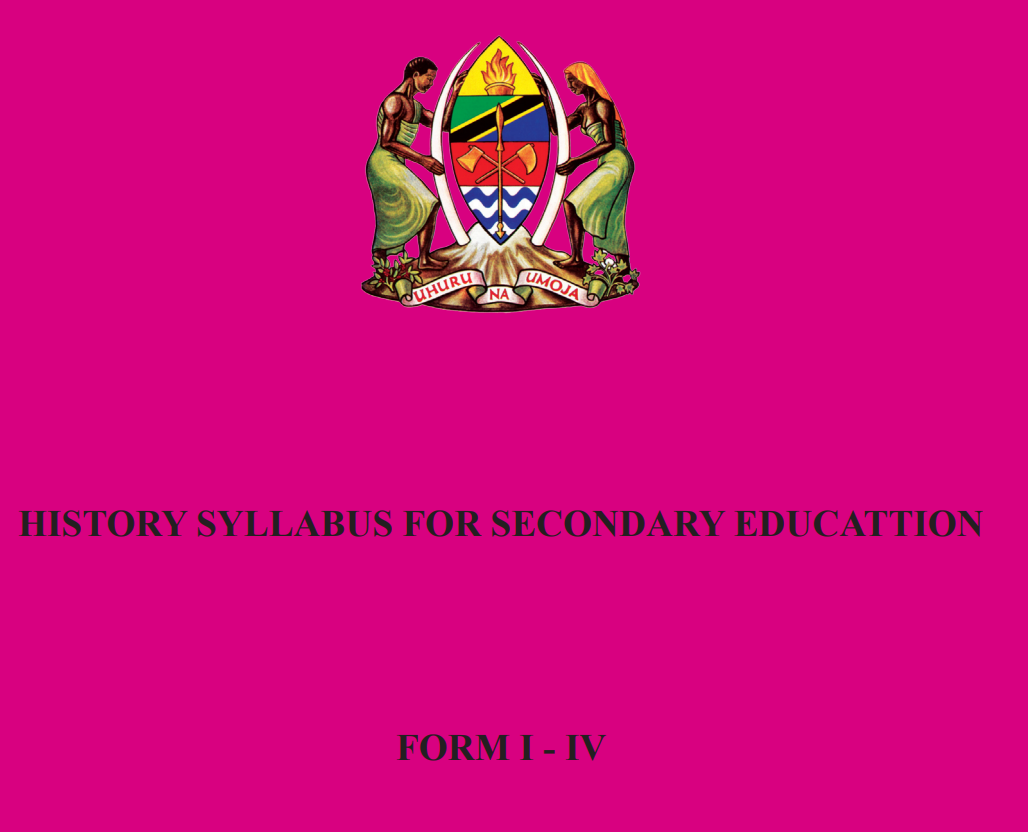HISTORY SYLLABUS FOR SECONDARY EDUCATION FORM I – IV PDF
o level history syllabus 2025, a level history syllabus 2024
This History syllabus is a revised version which has been prepared to replace that of 1996 which has phased out. The revision process focused on change in paradigm from that of content based to competence based curriculum. Moreover, the revision was inevitable due to the fact that the1996 syllabus did not sufficiently take into consideration the current social, cultural, global, technological, subject biases and cross cutting issues taking place worldwide but particularly in Tanzanian Society. In addition, the revision has also taken into consideration the requirements for the Secondary Education Development Plan (SEDP). This syllabus has been introduced for implementation from January 2005/2007
Aims and Objectives of Education in Tanzania
The general objectives of education in Tanzania are:
- a) To guide and promote the development and improvement of the personalities of the citizens of Tanzania, their resources and effective utilization of those resources to bring about individual development.
- b) To promote the acquisition and appreciation of the culture, customs and traditions of the people of Tanzania.
- c) To promote the acquisition and appropriate use of literacy, social, scientific, vocational, technological, professional and other forms of knowledge, skills and attitudes for the development and improvement of the condition of man and society.
- d) To develop and promote self-confidence and an inquiring mind, an understanding and respect for human dignity and human rights and readiness to work hard for self advancement and national development.
- e) To promote and expand the scope of acquisition, improvement and upgrading of mental, practical, productive and other skills needed to meet the changing needs of industry and the economy.
- f) To enable every citizen to understand and uphold the fundamentals of the National Constitution as well as the enshrined human and civic rights, obligations and responsibilities.
- g) To promote love and respect for work, self and wage employment and improved performance in the production and service sectors.
- h) To inculcate principles of the national ethic and integrity, national and international cooperation, peace and justice through the study, understanding and adherence to the provision of the National Constitution and other international basic charters;
- i) To enable a rational use, management and conservation of the environment.
Aims and Objectives of Secondary Education
In Tanzania secondary education refers to post primary formal education offered to learners who successfully completed seven years of primary education and have met requisite entry qualifications. The aims and objectives of secondary education are to:
- a) Consolidate and broaden the scope of baseline ideas, knowledge, skills and attitudes, acquired and developed at the primary education level.
- b) Enhance the development and appreciation of national unity, identity and ethic; personal integrity, respect for human rights, cultural and moral values, customs, traditions and civic responsibilities and obligations.
- c) Promote linguistic ability and effective use of communication skills in Kiswahili, English and other languages.
- d) Prepare opportunities for the acquisition of knowledge, skills, attitudes and understanding in prescribed or selected fields of study.
- e) Prepare students for tertiary and higher education, vocational, technical and professional training.
- f) Inculcate a sense and ability for self-study, self-confidence and self-advancement in new frontiers of science and technology, academic and occupational knowledge and skills.
- g) Prepare the students to join the world of work.
General Subject Competences
General competences are expressions that describe what a secondary school student does as a result of teaching and learning this subject. It is, therefore, expected that History student:
- a) Demonstrates understanding of the origins of African societies and how they developed.
- b) Shows the ability to critically assess the events, conditions and factors which shaped the past and present conditions of the world.
- c) Shows an understanding of the problems experiences by African societies in the past and demonstrate the ability to analyse the efforts made to solve them.
- d) Demonstrates an understanding and appreciation of and the ability to critically assess the cultural, political, economic and technological advancement made by African societies before and after colonial rule.
- e) Shows an understanding of an ability to objectively relate Africa’s developmental problems with foreign intrusion, colonial domination, cultural subjugation and economic exploitation across time.
- f) Demonstrates an understanding and appreciation of the efforts made and strategies used by African people to regain their independence and resist neo-colonialism.
- g) Demonstrates an understanding and appreciation of the need for African unity, cooperation and interdependence.
- h) Demonstrates basic skills of critical thinking, reasoning, judgement, empathy and effective participation in developmental activities.


